Le monde devient fou, poussant la calculatrice 2 + 2 dans les nuages. Pourquoi sommes-nous pires? Poussons Hello World dans trois microservices, écrivons quelques tests, fournissons aux utilisateurs de la documentation, dessinons un magnifique pipeline de l'assemblage et fournissons un déploiement vers une prod cloud conditionnelle une fois les tests réussis. Ainsi, cet article montrera un exemple de la façon dont le processus de développement de produits peut être construit de la spécification au déploiement en passant par la prod. Intéressant? alors je demande sous kat
Où commence Roooo ...?
Il n'y a pas de patrie, mais un produit. C'est vrai, le produit commence par une idée. L'idée est donc la suivante:
- besoin d'un service qui renvoie «Hello World» via l'API REST
- le mot «Bonjour» donne un microservice conçu, créé et testé par command_1
- le mot «World» donne le second, qui est dirigé par team_2
- team_3 écrit un service d'intégration pour coller 'Hello' et 'World'
- OS (bureau) - Debian 9 Stretch
- IDE - IntelliJ IDEA 2019.1
- Git Repo - GitHub
- CI - Concourse 5.4.0
- Maven Repo - Nexus
- Openjdk 11
- Maven 3.6.0
- Kubernetes 1.14 (1 maître + 1 travailleur): réseau calico, contrôleur nginx-ingress
Remarque importante: l' article ne concerne pas le beau code (codestyle, checkstyle, javadocs, SOLID et autres mots à la mode) et les solutions léchées à la perfection (vous pouvez sans cesse parler du parfait Hello World). Il s'agit de savoir comment assembler le code, les spécifications, l'assemblage du pipeline et la livraison de tout ce qui est assemblé dans la prod, mais au lieu de HelloWorld, en réalité, vous pouvez avoir un produit très chargé avec un tas de microservices complexes et cool, et le processus décrit peut lui être appliqué.
En quoi consiste le service?
Le service sous forme de produit final doit contenir:
- spécification sous forme de document yaml de la norme OpenAPI et pouvoir le fournir sur demande (GET / doc)
- Méthodes API comme spécifié dans le premier paragraphe
- README.md avec des exemples de démarrage et de configuration d'un service
Nous analyserons les services dans l'ordre. C'est parti!
Microservice «Bonjour»
Spécification
Nous écrivons les spécifications dans l'éditeur Swagger et les convertissons en spécifications OpenAPI. Swagger Editor est lancé dans le docker avec une seule commande, la conversion des docks swagger en openapi-doc se fait en appuyant sur un seul bouton dans l'interface utilisateur de l'éditeur, qui envoie une requête POST / api / convert à http://converter.swagger.io . La spécification finale du service bonjour:
openapi: 3.0.1 info: title: Hello ;) description: Hello microservice version: 1.0.0 servers: - url: https://demo1.bihero.io/api/hello tags: - name: hello description: Everything about saying 'Hello' paths: /: x-vertx-event-bus: address: service.hello timeout: 1000c get: tags: - hello summary: Get 'Hello' word operationId: getHelloWord responses: 200: description: OK /doc: x-vertx-event-bus: address: service.hello timeout: 1000c get: tags: - hello_doc summary: Get 'Hello' microservice documentation operationId: getDoc responses: 200: description: OK components: {}
Implémentation
Le service du point de vue du code à écrire se compose de 3 classes:
- interface avec les méthodes de service (les noms de méthode sont spécifiés dans la spécification comme operationId )
- implémentation d'interface
- vertx verticle pour lier le service avec spec (méthodes api -> méthodes d'interface du premier paragraphe) et pour démarrer le serveur http
La structure du fichier dans src ressemble à ceci:

pom.xml <?xml version="1.0" encoding="UTF-8"?> <project xmlns="http://maven.apache.org/POM/4.0.0" xmlns:xsi="http://www.w3.org/2001/XMLSchema-instance" xsi:schemaLocation="http://maven.apache.org/POM/4.0.0 http://maven.apache.org/xsd/maven-4.0.0.xsd"> <modelVersion>4.0.0</modelVersion> <properties> <main.verticle>io.bihero.hello.HelloVerticle</main.verticle> <vertx.version>3.8.1</vertx.version> <logback.version>1.2.3</logback.version> <junit-jupiter.version>5.3.1</junit-jupiter.version> <maven-surefire-plugin.version>2.19.1</maven-surefire-plugin.version> <junit-platform-surefire-provider.version>1.1.0</junit-platform-surefire-provider.version> <assertj-core.version>3.8.0</assertj-core.version> <allure.version>2.8.1</allure.version> <allure-maven.version>2.10.0</allure-maven.version> <aspectj.version>1.9.2</aspectj.version> <mockito.version>2.21.0</mockito.version> <rest-assured.version>3.0.0</rest-assured.version> </properties> <groupId>io.bihero</groupId> <artifactId>hello-microservice</artifactId> <version>1.0.0-SNAPSHOT</version> <build> <plugins> <plugin> <artifactId>maven-compiler-plugin</artifactId> <configuration> ```1.8</source> <target>1.8</target> </configuration> <executions> <execution> <id>default-compile</id> <configuration> <annotationProcessors> <annotationProcessor>io.vertx.codegen.CodeGenProcessor</annotationProcessor> </annotationProcessors> <generatedSourcesDirectory>src/main/generated</generatedSourcesDirectory> <compilerArgs> <arg>-Acodegen.output=${project.basedir}/src/main</arg> </compilerArgs> </configuration> </execution> <execution> <id>default-testCompile</id> <configuration> <annotationProcessors> <annotationProcessor>io.vertx.codegen.CodeGenProcessor</annotationProcessor> </annotationProcessors> <generatedTestSourcesDirectory>src/test/generated</generatedTestSourcesDirectory> <compilerArgs> <arg>-Acodegen.output=${project.basedir}/src/test</arg> </compilerArgs> </configuration> </execution> </executions> </plugin> <plugin> <groupId>org.apache.maven.plugins</groupId> <artifactId>maven-surefire-plugin</artifactId> <version>${maven-surefire-plugin.version}</version> <configuration> <properties> <property> <name>listener</name> <value>io.qameta.allure.junit5.AllureJunit5</value> </property> </properties> <includes> <include>**/*Test*.java</include> </includes> <argLine> -javaagent:"${settings.localRepository}/org/aspectj/aspectjweaver/${aspectj.version}/aspectjweaver-${aspectj.version}.jar" -Djdk.net.URLClassPath.disableClassPathURLCheck=true </argLine> <systemProperties> <property> <name>allure.results.directory</name> <value>${project.basedir}/target/allure-results</value> </property> <property> <name>junit.jupiter.extensions.autodetection.enabled</name> <value>true</value> </property> </systemProperties> <reportFormat>plain</reportFormat> </configuration> <dependencies> <dependency> <groupId>org.aspectj</groupId> <artifactId>aspectjweaver</artifactId> <version>${aspectj.version}</version> </dependency> <dependency> <groupId>org.junit.platform</groupId> <artifactId>junit-platform-surefire-provider</artifactId> <version>${junit-platform-surefire-provider.version}</version> </dependency> <dependency> <groupId>org.junit.jupiter</groupId> <artifactId>junit-jupiter-engine</artifactId> <version>${junit-jupiter.version}</version> </dependency> </dependencies> </plugin> <plugin> <groupId>io.qameta.allure</groupId> <artifactId>allure-maven</artifactId> <version>${allure-maven.version}</version> </plugin> <plugin> <groupId>org.apache.maven.plugins</groupId> <artifactId>maven-site-plugin</artifactId> <version>3.7.1</version> <dependencies> <dependency> <groupId>org.apache.maven.wagon</groupId> <artifactId>wagon-webdav-jackrabbit</artifactId> <version>2.8</version> </dependency> </dependencies> </plugin> <plugin> <groupId>org.apache.maven.plugins</groupId> <artifactId>maven-project-info-reports-plugin</artifactId> <version>3.0.0</version> </plugin> <plugin> <groupId>org.apache.maven.plugins</groupId> <artifactId>maven-shade-plugin</artifactId> <version>2.3</version> <executions> <execution> <phase>package</phase> <goals> <goal>shade</goal> </goals> <configuration> <transformers> <transformer implementation="org.apache.maven.plugins.shade.resource.ManifestResourceTransformer"> <manifestEntries> <Main-Class>io.vertx.core.Launcher</Main-Class> <Main-Verticle>${main.verticle}</Main-Verticle> </manifestEntries> </transformer> <transformer implementation="org.apache.maven.plugins.shade.resource.AppendingTransformer"> <resource>META-INF/services/io.vertx.core.spi.VerticleFactory</resource> </transformer> </transformers> <artifactSet> </artifactSet> <outputFile>${project.build.directory}/${project.artifactId}-fat.jar</outputFile> </configuration> </execution> </executions> </plugin> </plugins> <resources> <resource> <directory>src/main/resources</directory> <filtering>true</filtering> <includes> <include>**/version.txt</include> </includes> </resource> <resource> <directory>src/main/resources</directory> <filtering>false</filtering> <excludes> <exclude>**/version.txt</exclude> </excludes> </resource> </resources> </build> <distributionManagement> <site> <id>reports</id> <url>dav:https://nexus.dev.techedge.pro:8443/repository/reports/${project.artifactId}/</url> </site> </distributionManagement> <reporting> <excludeDefaults>true</excludeDefaults> <plugins> <plugin> <groupId>io.qameta.allure</groupId> <artifactId>allure-maven</artifactId> <configuration> <resultsDirectory>${project.build.directory}/allure-results</resultsDirectory> <reportDirectory>${project.reporting.outputDirectory}/${project.version}/allure</reportDirectory> </configuration> </plugin> </plugins> </reporting> <dependencies> <dependency> <groupId>io.vertx</groupId> <artifactId>vertx-web-api-service</artifactId> <version>${vertx.version}</version> </dependency> <dependency> <groupId>io.vertx</groupId> <artifactId>vertx-codegen</artifactId> <version>${vertx.version}</version> <scope>provided</scope> </dependency> <dependency> <groupId>ch.qos.logback</groupId> <artifactId>logback-classic</artifactId> <version>${logback.version}</version> </dependency> <dependency> <groupId>io.vertx</groupId> <artifactId>vertx-unit</artifactId> <version>${vertx.version}</version> <scope>test</scope> </dependency> <dependency> <groupId>io.vertx</groupId> <artifactId>vertx-junit5</artifactId> <version>${vertx.version}</version> <scope>test</scope> </dependency> <dependency> <groupId>org.junit.jupiter</groupId> <artifactId>junit-jupiter-api</artifactId> <version>${junit-jupiter.version}</version> <scope>test</scope> </dependency> <dependency> <groupId>org.junit.jupiter</groupId> <artifactId>junit-jupiter-engine</artifactId> <version>${junit-jupiter.version}</version> <scope>test</scope> </dependency> <dependency> <groupId>org.assertj</groupId> <artifactId>assertj-core</artifactId> <version>${assertj-core.version}</version> <scope>test</scope> </dependency> <dependency> <groupId>org.mockito</groupId> <artifactId>mockito-core</artifactId> <version>${mockito.version}</version> <scope>test</scope> </dependency> <dependency> <groupId>io.qameta.allure</groupId> <artifactId>allure-junit5</artifactId> <version>${allure.version}</version> <scope>test</scope> </dependency> <dependency> <groupId>io.vertx</groupId> <artifactId>vertx-web-client</artifactId> <version>${vertx.version}</version> <scope>test</scope> </dependency> </dependencies> </project>
HelloService.java package io.bihero.hello; import io.vertx.core.AsyncResult; import io.vertx.core.Handler; import io.vertx.core.Vertx; import io.vertx.ext.web.api.OperationRequest; import io.vertx.ext.web.api.OperationResponse; import io.vertx.ext.web.api.generator.WebApiServiceGen; @WebApiServiceGen public interface HelloService { static HelloService create(Vertx vertx) { return new DefaultHelloService(vertx); } void getHelloWord(OperationRequest context, Handler<AsyncResult<OperationResponse>> resultHandler); void getDoc(OperationRequest context, Handler<AsyncResult<OperationResponse>> resultHandler); }
DefaultHelloService.java package io.bihero.hello; import io.vertx.core.AsyncResult; import io.vertx.core.Future; import io.vertx.core.Handler; import io.vertx.core.Vertx; import io.vertx.core.buffer.Buffer; import io.vertx.ext.web.api.OperationRequest; import io.vertx.ext.web.api.OperationResponse; public class DefaultHelloService implements HelloService { private final Vertx vertx; public DefaultHelloService(Vertx vertx) { this.vertx = vertx; } @Override public void getHelloWord(OperationRequest context, Handler<AsyncResult<OperationResponse>> resultHandler) { resultHandler.handle(Future.succeededFuture(OperationResponse.completedWithPlainText(Buffer.buffer("Hello")))); } @Override public void getDoc(OperationRequest context, Handler<AsyncResult<OperationResponse>> resultHandler) { vertx.fileSystem().readFile("doc.yaml", buffResult -> resultHandler.handle(Future.succeededFuture( OperationResponse.completedWithPlainText(buffResult.result())) )); } }
HelloVerticle.java package io.bihero.hello; import io.vertx.core.AbstractVerticle; import io.vertx.core.Promise; import io.vertx.core.eventbus.MessageConsumer; import io.vertx.core.http.HttpServer; import io.vertx.core.http.HttpServerOptions; import io.vertx.core.json.JsonObject; import io.vertx.ext.web.Router; import io.vertx.ext.web.api.contract.openapi3.OpenAPI3RouterFactory; import io.vertx.serviceproxy.ServiceBinder; public class HelloVerticle extends AbstractVerticle { private HttpServer server; private MessageConsumer<JsonObject> consumer; @Override public void start(Promise<Void> promise) { startHelloService(); startHttpServer().future().setHandler(promise); } @Override public void stop(){ this.server.close(); consumer.unregister(); } private void startHelloService() { consumer = new ServiceBinder(vertx).setAddress("service.hello") .register(HelloService.class, HelloService.create(getVertx())); } private Promise<Void> startHttpServer() { Promise<Void> promise = Promise.promise(); OpenAPI3RouterFactory.create(this.vertx, "/doc.yaml", openAPI3RouterFactoryAsyncResult -> { if (openAPI3RouterFactoryAsyncResult.succeeded()) { OpenAPI3RouterFactory routerFactory = openAPI3RouterFactoryAsyncResult.result();
Il n'y a rien d'inhabituel dans l'interface du service et son implémentation (à l'exception de l'annotation @WebApiServiceGen, mais vous pouvez en lire plus dans la documentation ), mais voici un aperçu du code de classe de verticle plus en détail.
Deux méthodes appelées au début de la verticale sont intéressantes:
- startHelloService crée un objet avec l'implémentation de notre service et le lie à l'adresse dans le bus d'événements (rappelez le paramètre x-vertx-event-bus.address de la spécification ci-dessus)
- startHttpServer crée une fabrique de routeurs sur la base de la spécification de service, crée un serveur http et accroche le routeur créé à la poignée de toutes les requêtes http entrantes (si c'est gurbo, la requête GET / tombera dans le bus d'événements vertex avec l'adresse service.hello (et nous nous y lierons) implémentation du service io.bihero.hello.HelloService ) et avec le nom de la méthode de service getHelloWord )
Il est temps de récupérer le dzharnik et d'essayer d'exécuter:
mvn clean package
Deux paramètres sont intéressants dans la ligne de lancement:
- -Dlogback.configurationFile =. / Src / conf / logback-console.xml - chemin d'accès au fichier de configuration pour la journalisation (les dépendances du projet doivent avoir slf4j et logback comme implémentation de slf4j-api)
- -conf ./src/conf/config.json - config de service, le port où l'API REST http sera ouverte est important pour nous:
{ "type": "file", "format": "json", "scanPeriod": 5000, "config": { "path": "/home/slava/JavaProjects/hello-world-to-cloud/hellomicroservice/src/conf/config.json" }, "serverPort": 8081, "serverHost": "0.0.0.0" }
La sortie du maven n'est pas particulièrement intéressante pour nous, mais vous pouvez voir comment le service a démarré (dans les paramètres de l'enregistreur pour le package io.netty , level = "INFO" est défini )
Comment démarrer le service 2019-10-03 20:52:45,159 [vert.x-worker-thread-0] DEBUG isvpOpenAPIV3Parser: Loaded raw data: openapi: 3.0.1 info: title: Hello ;) description: Hello microservice version: 1.0.0 servers: - url: https://demo1.bihero.io/api/hello tags: - name: hello description: Everything about saying 'Hello' paths: /: x-vertx-event-bus: address: service.hello timeout: 1000c get: tags: - hello summary: Get 'Hello' word operationId: getHelloWord responses: 200: description: OK /doc: x-vertx-event-bus: address: service.hello timeout: 1000c get: tags: - hello_doc summary: Get 'Hello' microservice documentation operationId: getDoc responses: 200: description: OK components: {} 2019-10-03 20:52:45,195 [vert.x-worker-thread-0] DEBUG isvpOpenAPIV3Parser: Parsed rootNode: {"openapi":"3.0.1","info":{"title":"Hello ;)","description":"Hello microservice","version":"1.0.0"},"servers":[{"url":"https://demo1.bihero.io/api/hello"}],"tags":[{"name":"hello","description":"Everything about saying 'Hello'"}],"paths":{"/":{"x-vertx-event-bus":{"address":"service.hello","timeout":"1000c"},"get":{"tags":["hello"],"summary":"Get 'Hello' word","operationId":"getHelloWord","responses":{"200":{"description":"OK"}}}},"/doc":{"x-vertx-event-bus":{"address":"service.hello","timeout":"1000c"},"get":{"tags":["hello_doc"],"summary":"Get 'Hello' microservice documentation","operationId":"getDoc","responses":{"200":{"description":"OK"}}}}},"components":{}} Oct 03, 2019 8:52:45 PM io.vertx.core.impl.launcher.commands.VertxIsolatedDeployer INFO: Succeeded in deploying verticle
Hourra! Le service fonctionne, vous pouvez vérifier:
curl http://127.0.0.1:8081/ Hello curl -v http://127.0.0.1:8081/doc openapi: 3.0.1 info: title: Hello ;) description: Hello microservice version: 1.0.0 servers: - url: https://demo1.bihero.io/api/hello tags: - name: hello description: Everything about saying 'Hello' paths: /: x-vertx-event-bus: address: service.hello timeout: 1000c get: tags: - hello summary: Get 'Hello' word operationId: getHelloWord responses: 200: description: OK /doc: x-vertx-event-bus: address: service.hello timeout: 1000c get: tags: - hello_doc summary: Get 'Hello' microservice documentation operationId: getDoc responses: 200: description: OK components: {}
Le service répond avec le mot Bonjour à la demande GET / , qui correspond à la spécification, et peut parler de ce qu'il peut faire, en donnant la spécification de la demande GET / doc . Cool, passons à la prod!
Quelque chose ne va pas ici ...
Plus tôt, j'ai écrit que la sortie de maven lors du montage n'est pas très importante pour nous. J'ai menti, la conclusion est importante et très. Nous avons besoin de maven pour exécuter les tests et lorsque les tests tombent, l'assemblage tombe. L'assemblage ci-dessus a réussi, ce qui indique que les tests ont réussi ou non. Bien sûr, nous n'avons pas de tests, il est temps de les écrire (ici vous pouvez discuter des méthodologies, quand et comment écrire des tests, avant ou après la mise en œuvre, mais nous nous souviendrons d'une note importante au début de l'article et allez-y - nous écrirons quelques tests).
La première classe de test est, de par sa nature, un test unitaire qui teste deux méthodes spécifiques de notre service:
HelloServiceTest.java package io.bihero.hello; import io.vertx.core.Vertx; import io.vertx.core.json.JsonObject; import io.vertx.ext.web.api.OperationRequest; import io.vertx.junit5.VertxExtension; import io.vertx.junit5.VertxTestContext; import org.apache.commons.io.IOUtils; import org.junit.jupiter.api.DisplayName; import org.junit.jupiter.api.Test; import org.junit.jupiter.api.extension.ExtendWith; import java.io.IOException; import static org.assertj.core.api.Assertions.assertThat; @ExtendWith(VertxExtension.class) public class HelloServiceTest { private HelloService helloService = HelloService.create(Vertx.vertx()); @Test @DisplayName("Test 'getHelloWord' method returns 'Hello' word") public void testHelloMethod(VertxTestContext testContext) { helloService.getHelloWord(new OperationRequest(new JsonObject()), testContext.succeeding(it -> { assertThat(it.getStatusCode()).isEqualTo(200); assertThat(it.getPayload().toString()).isEqualTo("Hello"); testContext.completeNow(); })); } @Test @DisplayName("Test 'getDoc' method returns service documentation in OpenAPI format") public void testDocMethod(VertxTestContext testContext) { helloService.getDoc(new OperationRequest(new JsonObject()), testContext.succeeding(it -> { try { assertThat(it.getStatusCode()).isEqualTo(200); assertThat(it.getPayload().toString()).isEqualTo(IOUtils.toString(this.getClass() .getResourceAsStream("../../../doc.yaml"), "UTF-8")); testContext.completeNow(); } catch (IOException e) { testContext.failNow(e); } })); } }
Le deuxième test est un test de non-intégration, vérifiant que la verticale monte et répond aux requêtes http correspondantes avec les statuts et le texte attendus:
HelloVerticleTest.java package io.bihero.hello; import io.vertx.core.Vertx; import io.vertx.core.json.JsonObject; import io.vertx.ext.web.client.WebClient; import io.vertx.ext.web.codec.BodyCodec; import io.vertx.junit5.Checkpoint; import io.vertx.junit5.VertxExtension; import io.vertx.junit5.VertxTestContext; import org.apache.commons.io.IOUtils; import org.junit.jupiter.api.DisplayName; import org.junit.jupiter.api.Test; import org.junit.jupiter.api.extension.ExtendWith; import static org.assertj.core.api.Assertions.assertThat; import static org.mockito.Mockito.doReturn; import static org.mockito.Mockito.spy; @ExtendWith(VertxExtension.class) public class HelloVerticleTest { @Test @DisplayName("Test that verticle is up and respond me by 'Hello' word and doc in OpenAPI format") public void testHelloVerticle(Vertx vertx, VertxTestContext testContext) { WebClient webClient = WebClient.create(vertx); Checkpoint deploymentCheckpoint = testContext.checkpoint(); Checkpoint requestCheckpoint = testContext.checkpoint(2); HelloVerticle verticle = spy(new HelloVerticle()); JsonObject config = new JsonObject().put("serverPort", 8081).put("serverHost", "0.0.0.0"); doReturn(config).when(verticle).config(); vertx.deployVerticle(verticle, testContext.succeeding(id -> { deploymentCheckpoint.flag();
Il est temps de construire un service avec des tests:
mvn clean package
Nous sommes très intéressés par le journal du plugin surefire, il ressemblera à ceci (l'image est cliquable):
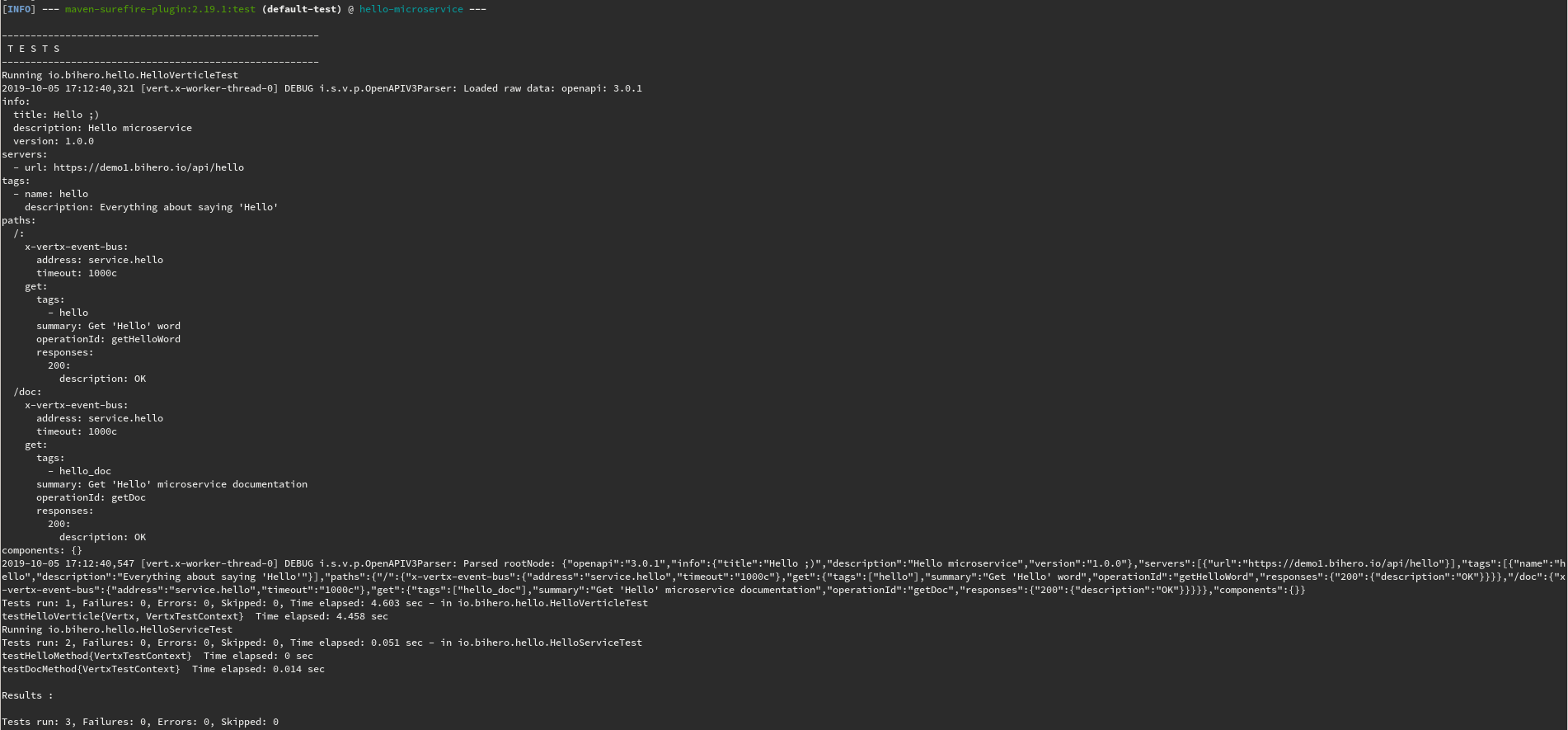
Ouah! Le service est assemblé, les tests s'exécutent et ne se bloquent pas (un peu plus tard, nous parlerons de la beauté de la façon dont les résultats des tests sont présentés aux autorités), il est temps de réfléchir à la façon dont nous le livrerons aux utilisateurs (c'est-à-dire aux serveurs). Dans la cour, fin 2019, et bien sûr, nous regrouperons l'application sous la forme d'une image docker. C'est parti!
Docker et tous tous tous
Nous allons construire une image Docker pour notre premier service basé sur adoptopenjdk/openjdk11 . Ajoutez à l'image notre dzharnik assemblé avec toutes les configurations nécessaires et écrivez dans le fichier docker la commande pour démarrer l'application dans le conteneur. Le Dockerfile résultant ressemblera à ceci:
FROM adoptopenjdk/openjdk11:alpine-jre COPY target/hello-microservice-fat.jar app.jar COPY src/conf/config.json . COPY src/conf/logback-console.xml . COPY run.sh . RUN chmod +x run.sh CMD ["./run.sh"]
Le script run.sh ressemble à ceci:
Nous n'avons pas encore vraiment besoin de la variable d' environnement JVM_OPTS à ce stade, mais un peu plus tard nous la modifierons activement et ajusterons les paramètres de la machine virtuelle et de nos services. Il est temps d'assembler l'image et d'exécuter l'application dans le conteneur:
docker build -t="hellomicroservice" . docker run -dit --name helloms hellomicroservice
Nous obtenons l'adresse IP du conteneur et vérifions le fonctionnement du service à l'intérieur du conteneur:
docker inspect helloms | grep IPAddress "SecondaryIPAddresses": null, "IPAddress": "172.17.0.2", "IPAddress": "172.17.0.2",
curl http://172.17.0.2:8081/
Ainsi, le service démarre dans le conteneur. Mais nous ne le ferons pas avec nos mains comme ça (docker run) dans un environnement de production, pour cela nous avons de merveilleux kubernetes. Pour exécuter l'application dans kubernetes, nous avons besoin d'un modèle, d'un fichier yml, avec une description des ressources (déploiement, service, entrée, etc.) que nous allons exécuter et en fonction de quel conteneur. Mais, avant de commencer à décrire le modèle de lancement de l'application dans k8s, poussez l'image précédemment assemblée dans le dockerhab:
docker tag hello bihero/hello docker push bihero/hello
Nous écrivons un modèle pour lancer l'application dans kubernetes (dans le cadre de l'article, nous ne sommes pas de vrais soudeurs et ne prétendons pas être un modèle «casher»):
apiVersion: extensions/v1beta1 kind: Deployment metadata: labels: io.bihero.hello.service: bihero-hello name: bihero-hello spec: replicas: 3 strategy: type: RollingUpdate rollingUpdate: maxSurge: 1 maxUnavailable: 1 template: metadata: labels: io.bihero.hello.service: bihero-hello spec: containers: - image: bihero/hello:${HELLO_SERVICE_IMAGE_VERSION} name: bihero-hello ports: - containerPort: 8081 imagePullPolicy: Always resources: {} restartPolicy: Always --- apiVersion: v1 kind: Service metadata: labels: io.bihero.hello.service: bihero-hello name: bihero-hello spec: ports: - name: "8081" port: 8081 targetPort: 8081 selector: io.bihero.hello.service: bihero-hello status: loadBalancer: {} --- apiVersion: extensions/v1beta1 kind: Ingress metadata: name: bihero-hello annotations: kubernetes.io/ingress.class: nginx nginx.ingress.kubernetes.io/ssl-redirect: "true" nginx.ingress.kubernetes.io/secure-backends: "false" nginx.ingress.kubernetes.io/ssl-passthrough: "false" nginx.ingress.kubernetes.io/rewrite-target: /$2 kubernetes.io/tls-acme: "true" namespace: default spec: tls: - hosts: - ${ID_DOMAIN} secretName: bihero rules: - host: ${ID_DOMAIN} http: paths: - path: /api/hello(/|$)(.*) backend: serviceName: bihero-hello servicePort: 8081
En bref sur ce que nous voyons dans le modèle:
- Déploiement : nous décrivons ici à partir de quelle image nous déployons et à partir du nombre d'instances que nous créons un jeu de répliques pour notre service. Il est également important de prêter attention aux metadata.labels - sur eux, nous lierons le service au déploiement
- Service : nous lions le service au déploiement / jeu de réplicas. En substance, un service dans k8s est quelque chose auquel il est déjà possible d'envoyer des requêtes http à l' intérieur d'un cluster (et oui - faites attention au sélecteur )
- Entrée : l'entrée est nécessaire pour exposer le service au monde extérieur. Nous encapsulerons toutes les demandes commençant par / api / hello sur notre service hello ( https://domain.com/api/hello -> http: //bihero-hello.service.internal.domain.local: 8081 / )
Le modèle comprend également deux variables d'environnement:
- $ {HELLO_SERVICE_IMAGE_VERSION} - balise de l'image docker avec le service à partir duquel nous collecterons notre premier déploiement
- $ {ID_DOMAIN} - le domaine sur lequel nous déploierons nos services
La chose importante à propos de https
Le cluster de test possède déjà un secret nommé bihero , créé sur la base du certificat générique de LetsEncrypt. En bref, l'équipe ressemble à ceci
kubectl create secret tls bihero --key keys/privkey.pem --cert keys/fullchain.pem
où privkey.pem et fullchain.pem sont les fichiers générés par letsencrypt
Vous pouvez en savoir plus sur la création d'un secret pour tls dans k8s en suivant le lien
Il est temps d'essayer de déployer dans k8s :) C'est parti!
export HELLO_SERVICE_IMAGE_VERSION=latest export ID_DOMAIN=demo1.bihero.io cat k8s.yaml | envsubst | kubectl apply -f -
Dans stdout, vous devriez voir ceci:
deployment.extensions/bihero-hello created service/bihero-hello created ingress.extensions/bihero-hello created
Eh bien, vérifions que kubernetes nous y a amenés:
kubectl get po

Comme prévu - 3 foyers
Voyons les détails d'un foyer
kubectl describe po bihero-hello-5b4759d55b-bf4qc
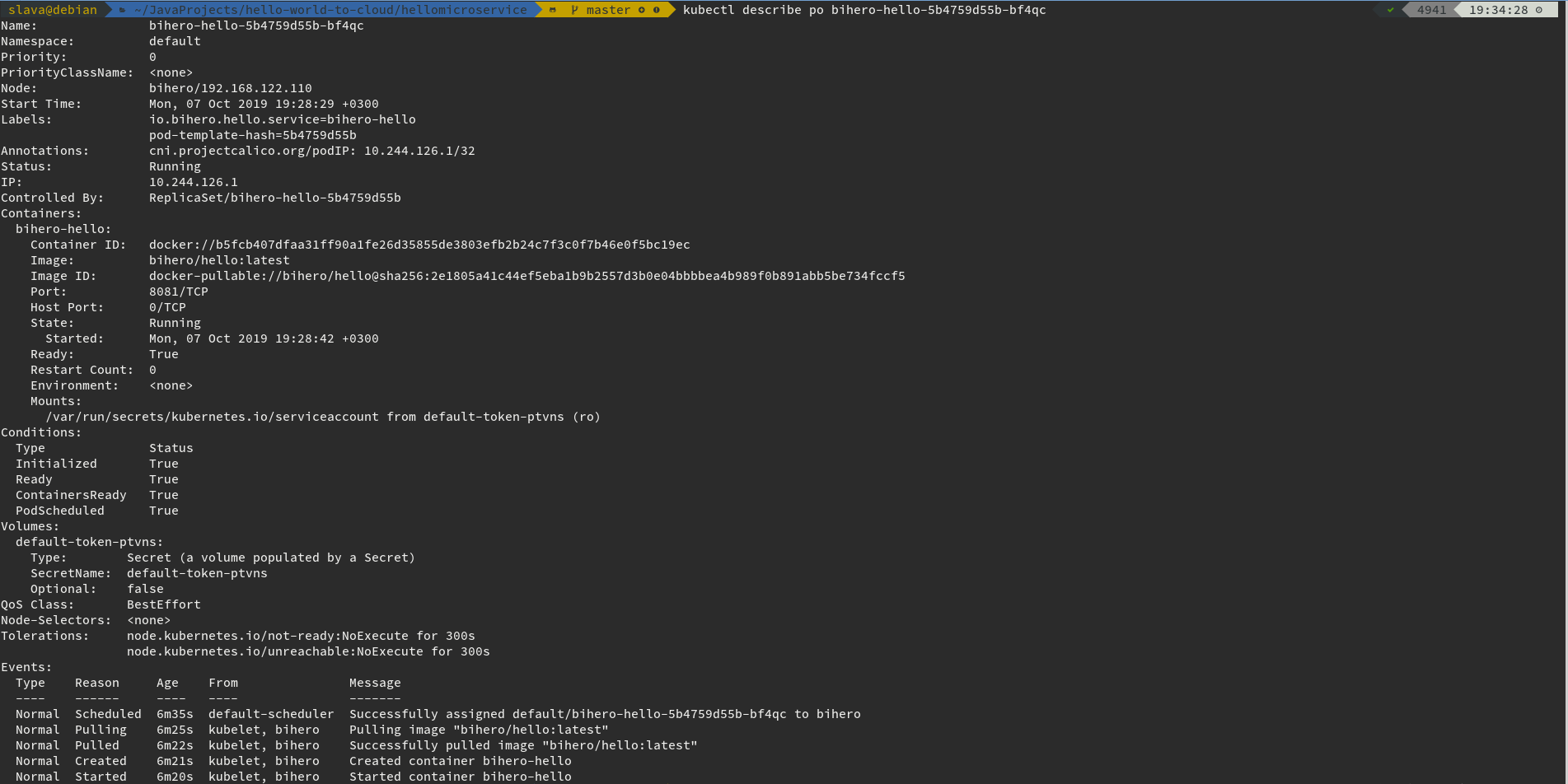
Comment fonctionne le service?
kubectl describe service bihero-hello

Et l'entrée?
kubectl describe ing bihero-hello

Ouah! Le service fonctionne en k8 et demande à être vérifié avec quelques demandes, selon les spécifications.
curl https://demo1.bihero.io/api/hello Hello
curl https://demo1.bihero.io/api/hello/doc openapi: 3.0.1 info: title: Hello ;) description: Hello microservice version: 1.0.0 servers: - url: https://demo1.bihero.io/api/hello tags: - name: hello description: Everything about saying 'Hello' paths: /: x-vertx-event-bus: address: service.hello timeout: 1000c get: tags: - hello summary: Get 'Hello' word operationId: getHelloWord responses: 200: description: OK /doc: x-vertx-event-bus: address: service.hello timeout: 1000c get: tags: - hello_doc summary: Get 'Hello' microservice documentation operationId: getDoc responses: 200: description: OK components: {}
A - Automatisation
Ouf ... Nous avons atteint le plus délicieux et passionnant. Beaucoup de travail a été fait et chaque étape s'est accompagnée du lancement manuel de certains outils, à chaque étape de la leur. , , k8s . , !
, , CI-.
?
- , , ( ), git-
- (mvn), (surefire, allure) — fat-jar
- docker- (docker build)
- Push docker- ( docker registry) (docker push)
- k8s (kubectl apply)
CI- ?
, ( ), . :
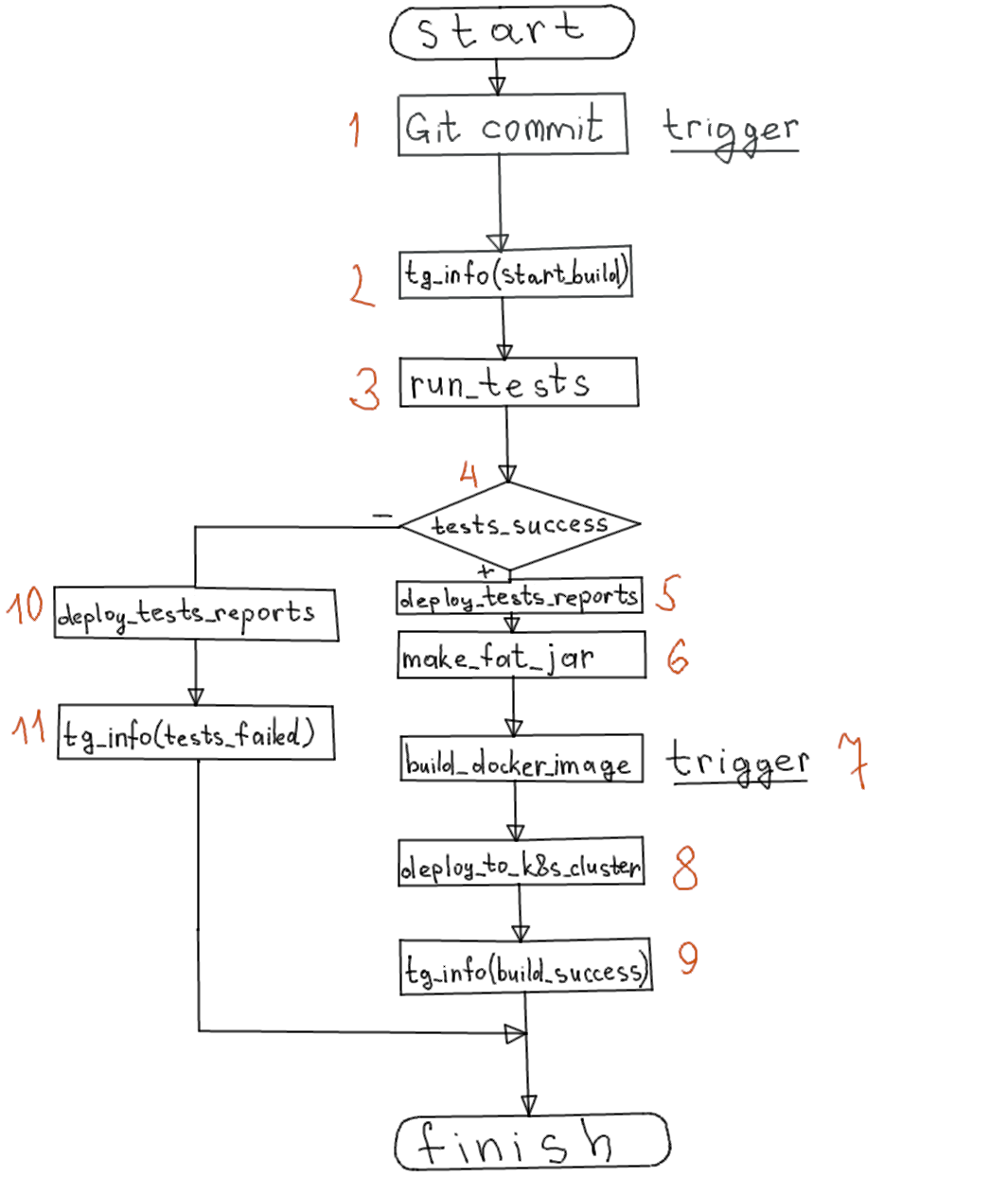
:
- , master ( master , , , merge' merge request' )
- , dev- (telegram-bot)
- ,
- — maven repository ( nexus blob store )
- fat-jar (mvn package, , — )
- docker image . , , , ( ). registry k8s
- k8s
- , k8s .
- 4- , , maven repository
- ,
Concourse CI
CI- Concourse . Concourse CI:
- UI ( yaml-, , fly ): — , (mvn, docker, fly, kubectl), , ( tg- )
- docker container', ( worker- , - environment- ) — , , .
, , :
pipeline.yaml resource_types: - name: telegram type: docker-image source: repository: vtutrinov/concourse-telegram-resource tag: latest - name: kubernetes type: docker-image source: repository: zlabjp/kubernetes-resource tag: 1.16 - name: metadata type: docker-image source: repository: olhtbr/metadata-resource tag: 2.0.1 resources: - name: metadata type: metadata - name: sources type: git source: branch: master uri: git@github.com:bihero-io/hello-microservice.git private_key: ((deployer-private-key)) - name: docker-image type: docker-image source: repository: bihero/hello username: ((docker-registry-user)) password: ((docker-registry-password)) - name: telegram type: telegram source: bot_token: ((telegram-ci-bot-token)) chat_id: ((telegram-group-to-report-build)) ci_url: ((ci_url)) command: "/build_hello_ms" - name: kubernetes-demo type: kubernetes source: server: https://178.63.194.241:6443 namespace: default kubeconfig: ((kubeconfig-demo)) jobs: - name: build-hello-microservice serial: true public: true plan: - in_parallel: - get: sources trigger: true - get: telegram trigger: true - put: metadata - put: telegram params: status: Build In Progress - task: unit-tests config: platform: linux image_resource: type: docker-image source: repository: ((docker-registry-uri))/bih/maven tag: 3-jdk-11 username: ((docker-private-registry-user)) password: ((docker-private-registry-password)) inputs: - name: sources outputs: - name: tested-workspace run: path: /bin/sh args: - -c - | output_dir=tested-workspace cp -R ./sources/* "${output_dir}/" mvn -f "${output_dir}/pom.xml" clean test caches: - path: ~/.m2/ on_failure: do: - task: tests-report config: platform: linux image_resource: type: docker-image source: repository: ((docker-registry-uri))/bih/maven tag: 3-jdk-11 username: ((docker-private-registry-user)) password: ((docker-private-registry-password)) inputs: - name: tested-workspace outputs: - name: message run: path: /bin/sh args: - -c - | output_dir=tested-workspace mvn -Dmaven.wagon.http.ssl.insecure=true -Dmaven.wagon.http.ssl.allowall=true -f "${output_dir}/pom.xml" site-deploy version=$(cat $output_dir/target/classes/version.txt) cat >message/msg <<EOL <a href="https://nexus.dev.techedge.pro:8443/repository/reports/hello-microservice/${version}/allure/">Allure report</a> EOL caches: - path: ~/.m2/ - put: telegram params: status: Build Failed (unit-tests) message_file: message/msg - task: tests-report config: platform: linux image_resource: type: docker-image source: repository: ((docker-registry-uri))/bih/maven tag: 3-jdk-11 username: ((docker-private-registry-user)) password: ((docker-private-registry-password)) inputs: - name: tested-workspace outputs: - name: message - name: tested-workspace run: path: /bin/sh args: - -c - | work_dir=tested-workspace mvn -Dmaven.wagon.http.ssl.insecure=true -Dmaven.wagon.http.ssl.allowall=true -f "${work_dir}/pom.xml" site-deploy version=$(cat $work_dir/target/classes/version.txt) cat >message/msg <<EOL <a href="https://nexus.dev.techedge.pro:8443/repository/reports/hello-microservice/${version}/allure/">Allure report</a> EOL caches: - path: ~/.m2/ - task: package config: platform: linux image_resource: type: docker-image source: repository: ((docker-registry-uri))/bih/maven tag: 3-jdk-11 username: ((docker-private-registry-user)) password: ((docker-private-registry-password)) inputs: - name: tested-workspace - name: metadata outputs: - name: app-packaged-workspace - name: metadata run: path: /bin/sh args: - -c - | output_dir=app-packaged-workspace cp -R ./tested-workspace/* "${output_dir}/" mvn -f "${output_dir}/pom.xml" package -Dmaven.main.skip -DskipTests env tag="-"$(cat metadata/build_name) echo $tag >> ${output_dir}/target/classes/version.txt cat ${output_dir}/target/classes/version.txt > metadata/version caches: - path: ~/.m2/ on_failure: do: - put: telegram params: status: Build Failed (package) - put: docker-image params: build: app-packaged-workspace tag_file: app-packaged-workspace/target/classes/version.txt tag_as_latest: true get_params: skip_download: true - task: make-k8s-app-template config: platform: linux image_resource: type: docker-image source: repository: bhgedigital/envsubst inputs: - name: sources - name: metadata outputs: - name: k8s run: path: /bin/sh args: - -c - | export DOMAIN=demo1.bihero.io export HELLO_SERVICE_IMAGE_VERSION=$(cat metadata/version) cat sources/k8s.yaml | envsubst > k8s/hello_app_template.yaml cat k8s/hello_app_template.yaml - put: kubernetes-demo params: kubectl: apply -f k8s/hello_app_template.yaml - put: telegram params: status: Build Success message_file: message/msg
:
- resource_types , , . ( , docker-, ): telegram tg- , kubernetes k8s- metadata ( , ..)
- resources , . , , docker-registry docker- , . input- ,
- jobs , . put- tg-. — get (, git-), — put — (docker image) , (metadata). task — docker- docker-image', image_resource
- ((parameter-name)) — , , , ( docker-registry).
:
fly -t bih sp -p hello-microservice -c pipeline.yaml -l credentials.yaml
credentials.yaml :
docker-registry-user: <dockerhub-user> docker-registry-password: <dockerhub-password> docker-registry-uri: <private-docker-registry-url> docker-private-registry-user: <private-docker-registry-user> docker-private-registry-password: <private-docker-registry-passwordl> telegram-ci-bot-token: <telegram-bot-token> telegram-group-to-report-build: <telegram-group-id> ci_url: <ci-server-url> deployer-private-key: | -----BEGIN OPENSSH PRIVATE KEY----- github-deploy-key -----END OPENSSH PRIVATE KEY----- kubeconfig-demo: | apiVersion: v1 clusters: - cluster: certificate-authority-data: <kube-cert-data> server: <kube-api-server-url> name: kubernetes contexts: - context: cluster: kubernetes user: kubernetes-admin name: kubernetes-admin@kubernetes current-context: kubernetes-admin@kubernetes kind: Config preferences: {} users: - name: kubernetes-admin user: client-certificate-data: <kube-client-cert-data> client-key-data: <kube-client-key-data>
. :
- CI-, :
- ( 1), c fly , CI-:
fly -t bih tj -j hello-microservice/build-hello-microservice -w
- /build_hello_ms -, telegram-group-to-report-build credentials.yaml
- master- (, , : master — , — ;) )
( ) -:
- :
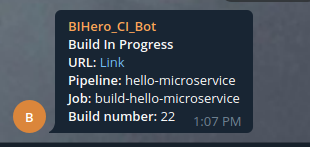
- :
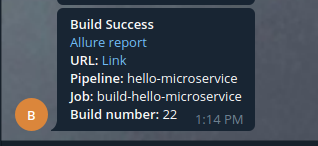
, UI CI-:
Hourra! , - , , k8s . :
- docker-hub'
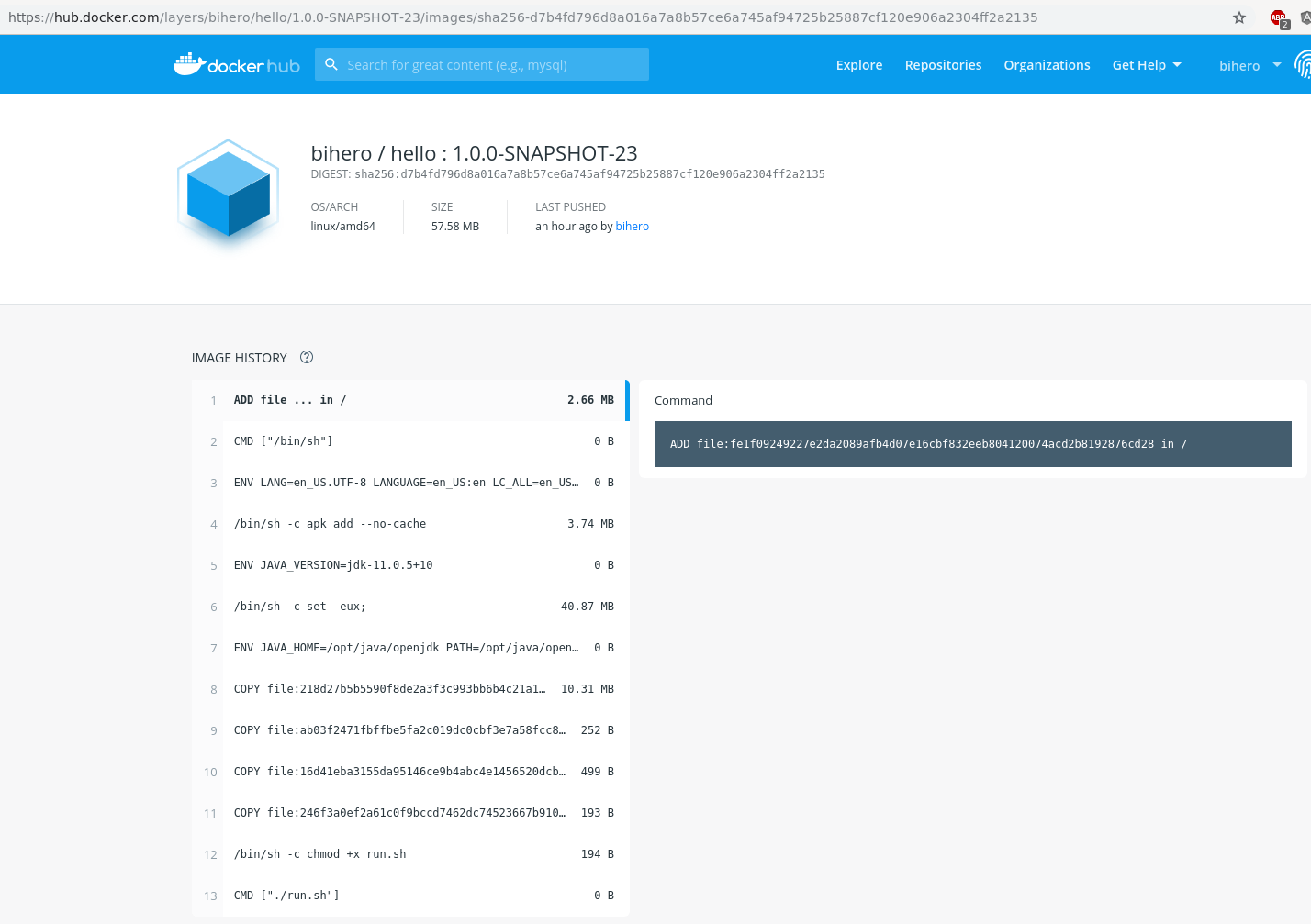

- , 2-
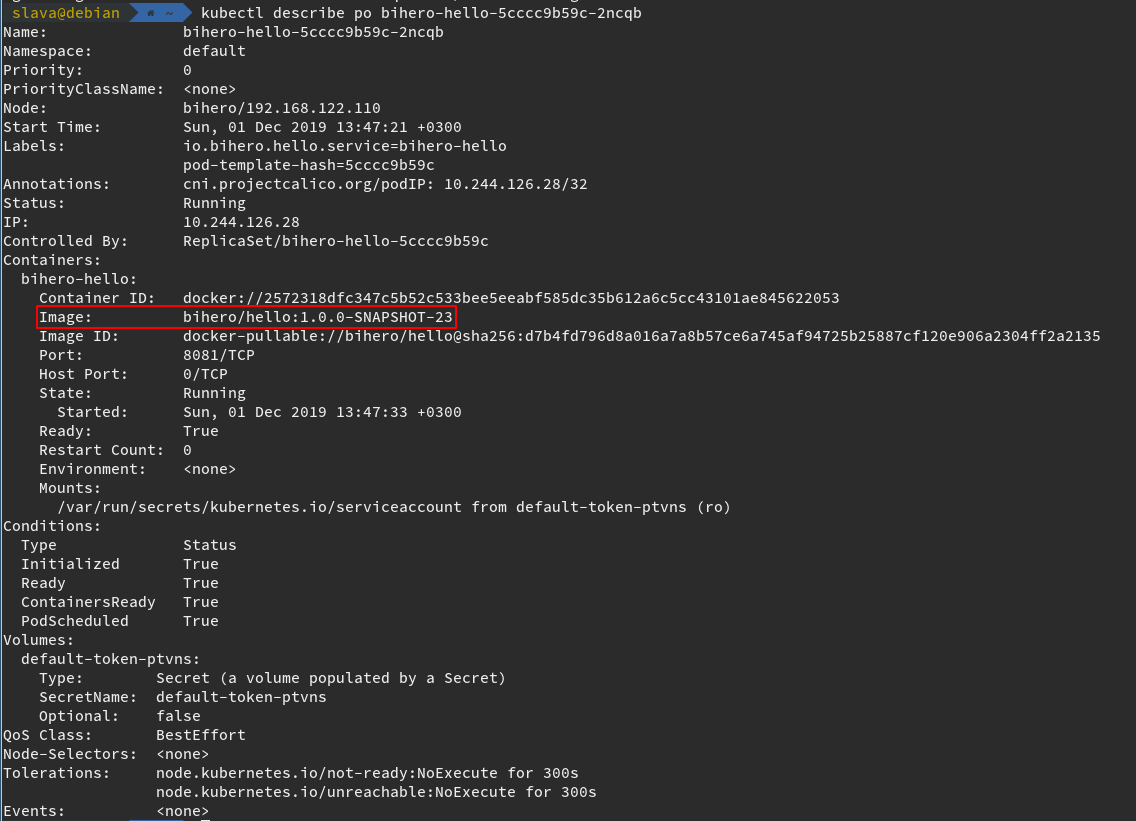
- :
curl https://demo1.bihero.io/api/hello -v curl https://demo1.bihero.io/api/hello -v 5350 14:59:04 * Trying 178.63.194.243... * TCP_NODELAY set * Connected to demo1.bihero.io (178.63.194.243) port 443 (
, , . , . , ( testcontainers). TODO- ( ). C'est parti!
'World' microservice
Service specification openapi: 3.0.1 info: title: World ;) description: "'World' word microservice" version: 1.0.0 servers: - url: https://demo1.bihero.io/api/world tags: - name: world description: Everything about 'World' word paths: /: x-vertx-event-bus: address: service.world timeout: 1000 get: tags: - world summary: Get 'World' word operationId: getWorldWord responses: 200: description: OK content: {} /doc: x-vertx-event-bus: address: service.world timeout: 1000c get: tags: - world summary: Get 'World' microservice documentation operationId: getDoc responses: 200: description: OK components: {}
pom.xml <?xml version="1.0" encoding="UTF-8"?> <project xmlns="http://maven.apache.org/POM/4.0.0" xmlns:xsi="http://www.w3.org/2001/XMLSchema-instance" xsi:schemaLocation="http://maven.apache.org/POM/4.0.0 http://maven.apache.org/xsd/maven-4.0.0.xsd"> <modelVersion>4.0.0</modelVersion> <properties> <main.verticle>io.bihero.world.WorldVerticle</main.verticle> <vertx.version>3.8.1</vertx.version> <logback.version>1.2.3</logback.version> <junit-jupiter.version>5.3.1</junit-jupiter.version> <maven-surefire-plugin.version>2.19.1</maven-surefire-plugin.version> <junit-platform-surefire-provider.version>1.1.0</junit-platform-surefire-provider.version> <assertj-core.version>3.8.0</assertj-core.version> <allure.version>2.8.1</allure.version> <allure-maven.version>2.10.0</allure-maven.version> <aspectj.version>1.9.2</aspectj.version> <mockito.version>2.21.0</mockito.version> <rest-assured.version>3.0.0</rest-assured.version> </properties> <groupId>io.bihero</groupId> <artifactId>world-microservice</artifactId> <version>1.0.0-SNAPSHOT</version> <build> <plugins> <plugin> <artifactId>maven-compiler-plugin</artifactId> <configuration> ```11</source> <target>11</target> </configuration> <executions> <execution> <id>default-compile</id> <configuration> <annotationProcessors> <annotationProcessor>io.vertx.codegen.CodeGenProcessor</annotationProcessor> </annotationProcessors> <generatedSourcesDirectory>src/main/generated</generatedSourcesDirectory> <compilerArgs> <arg>-Acodegen.output=${project.basedir}/src/main</arg> </compilerArgs> </configuration> </execution> <execution> <id>default-testCompile</id> <configuration> <annotationProcessors> <annotationProcessor>io.vertx.codegen.CodeGenProcessor</annotationProcessor> </annotationProcessors> <generatedTestSourcesDirectory>src/test/generated</generatedTestSourcesDirectory> <compilerArgs> <arg>-Acodegen.output=${project.basedir}/src/test</arg> </compilerArgs> </configuration> </execution> </executions> </plugin> <plugin> <groupId>org.apache.maven.plugins</groupId> <artifactId>maven-surefire-plugin</artifactId> <version>${maven-surefire-plugin.version}</version> <configuration> <properties> <property> <name>listener</name> <value>io.qameta.allure.junit5.AllureJunit5</value> </property> </properties> <includes> <include>**/*Test*.java</include> </includes> <argLine> -javaagent:"${settings.localRepository}/org/aspectj/aspectjweaver/${aspectj.version}/aspectjweaver-${aspectj.version}.jar" -Djdk.net.URLClassPath.disableClassPathURLCheck=true </argLine> <systemProperties> <property> <name>allure.results.directory</name> <value>${project.basedir}/target/allure-results</value> </property> <property> <name>junit.jupiter.extensions.autodetection.enabled</name> <value>true</value> </property> </systemProperties> <reportFormat>plain</reportFormat> </configuration> <dependencies> <dependency> <groupId>org.aspectj</groupId> <artifactId>aspectjweaver</artifactId> <version>${aspectj.version}</version> </dependency> <dependency> <groupId>org.junit.platform</groupId> <artifactId>junit-platform-surefire-provider</artifactId> <version>${junit-platform-surefire-provider.version}</version> </dependency> <dependency> <groupId>org.junit.jupiter</groupId> <artifactId>junit-jupiter-engine</artifactId> <version>${junit-jupiter.version}</version> </dependency> </dependencies> </plugin> <plugin> <groupId>io.qameta.allure</groupId> <artifactId>allure-maven</artifactId> <version>${allure-maven.version}</version> </plugin> <plugin> <groupId>org.apache.maven.plugins</groupId> <artifactId>maven-site-plugin</artifactId> <version>3.7.1</version> <dependencies> <dependency> <groupId>org.apache.maven.wagon</groupId> <artifactId>wagon-webdav-jackrabbit</artifactId> <version>2.8</version> </dependency> </dependencies> </plugin> <plugin> <groupId>org.apache.maven.plugins</groupId> <artifactId>maven-project-info-reports-plugin</artifactId> <version>3.0.0</version> </plugin> <plugin> <groupId>org.apache.maven.plugins</groupId> <artifactId>maven-shade-plugin</artifactId> <version>2.3</version> <executions> <execution> <phase>package</phase> <goals> <goal>shade</goal> </goals> <configuration> <transformers> <transformer implementation="org.apache.maven.plugins.shade.resource.ManifestResourceTransformer"> <manifestEntries> <Main-Class>io.vertx.core.Launcher</Main-Class> <Main-Verticle>${main.verticle}</Main-Verticle> </manifestEntries> </transformer> <transformer implementation="org.apache.maven.plugins.shade.resource.AppendingTransformer"> <resource>META-INF/services/io.vertx.core.spi.VerticleFactory</resource> </transformer> </transformers> <artifactSet> </artifactSet> <outputFile>${project.build.directory}/${project.artifactId}-fat.jar</outputFile> </configuration> </execution> </executions> </plugin> </plugins> <resources> <resource> <directory>src/main/resources</directory> <filtering>true</filtering> <includes> <include>**/version.txt</include> </includes> </resource> <resource> <directory>src/main/resources</directory> <filtering>false</filtering> <excludes> <exclude>**/version.txt</exclude> </excludes> </resource> </resources> </build> <distributionManagement> <site> <id>reports</id> <url>dav:https://nexus.dev.techedge.pro:8443/repository/reports/${project.artifactId}/</url> </site> </distributionManagement> <reporting> <excludeDefaults>true</excludeDefaults> <plugins> <plugin> <groupId>io.qameta.allure</groupId> <artifactId>allure-maven</artifactId> <configuration> <resultsDirectory>${project.build.directory}/allure-results</resultsDirectory> <reportDirectory>${project.reporting.outputDirectory}/${project.version}/allure</reportDirectory> </configuration> </plugin> </plugins> </reporting> <dependencies> <dependency> <groupId>io.vertx</groupId> <artifactId>vertx-web-api-service</artifactId> <version>${vertx.version}</version> </dependency> <dependency> <groupId>io.vertx</groupId> <artifactId>vertx-codegen</artifactId> <version>${vertx.version}</version> <scope>provided</scope> </dependency> <dependency> <groupId>ch.qos.logback</groupId> <artifactId>logback-classic</artifactId> <version>${logback.version}</version> </dependency> <dependency> <groupId>io.vertx</groupId> <artifactId>vertx-unit</artifactId> <version>${vertx.version}</version> <scope>test</scope> </dependency> <dependency> <groupId>io.vertx</groupId> <artifactId>vertx-junit5</artifactId> <version>${vertx.version}</version> <scope>test</scope> </dependency> <dependency> <groupId>org.junit.jupiter</groupId> <artifactId>junit-jupiter-api</artifactId> <version>${junit-jupiter.version}</version> <scope>test</scope> </dependency> <dependency> <groupId>org.junit.jupiter</groupId> <artifactId>junit-jupiter-engine</artifactId> <version>${junit-jupiter.version}</version> <scope>test</scope> </dependency> <dependency> <groupId>org.assertj</groupId> <artifactId>assertj-core</artifactId> <version>${assertj-core.version}</version> <scope>test</scope> </dependency> <dependency> <groupId>org.mockito</groupId> <artifactId>mockito-core</artifactId> <version>${mockito.version}</version> <scope>test</scope> </dependency> <dependency> <groupId>io.qameta.allure</groupId> <artifactId>allure-junit5</artifactId> <version>${allure.version}</version> <scope>test</scope> </dependency> <dependency> <groupId>io.vertx</groupId> <artifactId>vertx-web-client</artifactId> <version>${vertx.version}</version> <scope>test</scope> </dependency> </dependencies> </project>
WorldService.java package io.bihero.world; import io.vertx.core.AsyncResult; import io.vertx.core.Handler; import io.vertx.core.Vertx; import io.vertx.ext.web.api.OperationRequest; import io.vertx.ext.web.api.OperationResponse; import io.vertx.ext.web.api.generator.WebApiServiceGen; @WebApiServiceGen public interface WorldService { static WorldService create(Vertx vertx) { return new DefaultWorldService(vertx); } void getWorldWord(OperationRequest context, Handler<AsyncResult<OperationResponse>> resultHandler); void getDoc(OperationRequest context, Handler<AsyncResult<OperationResponse>> resultHandler); }
DefaultWorldService.java package io.bihero.world; import io.vertx.core.AsyncResult; import io.vertx.core.Future; import io.vertx.core.Handler; import io.vertx.core.Vertx; import io.vertx.core.buffer.Buffer; import io.vertx.ext.web.api.OperationRequest; import io.vertx.ext.web.api.OperationResponse; public class DefaultWorldService implements WorldService { private final Vertx vertx; public DefaultWorldService(Vertx vertx) { this.vertx = vertx; } public void getWorldWord(OperationRequest context, Handler<AsyncResult<OperationResponse>> resultHandler) { resultHandler.handle(Future.succeededFuture(OperationResponse.completedWithPlainText(Buffer.buffer("World")))); } @Override public void getDoc(OperationRequest context, Handler<AsyncResult<OperationResponse>> resultHandler) { vertx.fileSystem().readFile("doc.yaml", buffResult -> resultHandler.handle(Future.succeededFuture( OperationResponse.completedWithPlainText(buffResult.result())) )); } }
WorldVerticle.java package io.bihero.world; import io.vertx.core.AbstractVerticle; import io.vertx.core.Promise; import io.vertx.core.eventbus.MessageConsumer; import io.vertx.core.http.HttpServer; import io.vertx.core.http.HttpServerOptions; import io.vertx.core.json.JsonObject; import io.vertx.ext.web.Router; import io.vertx.ext.web.api.contract.openapi3.OpenAPI3RouterFactory; import io.vertx.serviceproxy.ServiceBinder; public class WorldVerticle extends AbstractVerticle { HttpServer server; MessageConsumer<JsonObject> consumer; public void startWorldService() { consumer = new ServiceBinder(vertx).setAddress("service.world") .register(WorldService.class, WorldService.create(getVertx())); } private Promise<Void> startHttpServer() { Promise<Void> promise = Promise.promise(); OpenAPI3RouterFactory.create(this.vertx, "/doc.yaml", openAPI3RouterFactoryAsyncResult -> { if (openAPI3RouterFactoryAsyncResult.succeeded()) { OpenAPI3RouterFactory routerFactory = openAPI3RouterFactoryAsyncResult.result();
WorldServiceTest.java package io.bihero.world; import io.vertx.core.Vertx; import io.vertx.core.json.JsonObject; import io.vertx.ext.web.api.OperationRequest; import io.vertx.junit5.VertxExtension; import io.vertx.junit5.VertxTestContext; import org.apache.commons.io.IOUtils; import org.junit.jupiter.api.DisplayName; import org.junit.jupiter.api.Test; import org.junit.jupiter.api.extension.ExtendWith; import java.io.IOException; import static org.assertj.core.api.Assertions.assertThat; @ExtendWith(VertxExtension.class) public class WorldServiceTest { private WorldService worldService = WorldService.create(Vertx.vertx()); @Test @DisplayName("Test 'getWorldWord' method returns 'World' word") public void testHelloMethod(VertxTestContext testContext) { worldService.getWorldWord(new OperationRequest(new JsonObject()), testContext.succeeding(it -> { assertThat(it.getStatusCode()).isEqualTo(200); assertThat(it.getPayload().toString()).isEqualTo("World"); testContext.completeNow(); })); } @Test @DisplayName("Test 'getDoc' method returns service documentation in OpenAPI format") public void testDocMethod(VertxTestContext testContext) { worldService.getDoc(new OperationRequest(new JsonObject()), testContext.succeeding(it -> { try { assertThat(it.getStatusCode()).isEqualTo(200); assertThat(it.getPayload().toString()).isEqualTo(IOUtils.toString(this.getClass() .getResourceAsStream("../../../doc.yaml"), "UTF-8")); testContext.completeNow(); } catch (IOException e) { testContext.failNow(e); } })); } }
WorldVerticleTest.java package io.bihero.world; import io.vertx.core.Vertx; import io.vertx.core.json.JsonObject; import io.vertx.ext.web.client.WebClient; import io.vertx.ext.web.codec.BodyCodec; import io.vertx.junit5.Checkpoint; import io.vertx.junit5.VertxExtension; import io.vertx.junit5.VertxTestContext; import org.apache.commons.io.IOUtils; import org.junit.jupiter.api.DisplayName; import org.junit.jupiter.api.Test; import org.junit.jupiter.api.extension.ExtendWith; import static org.assertj.core.api.Assertions.assertThat; import static org.mockito.Mockito.doReturn; import static org.mockito.Mockito.spy; @ExtendWith(VertxExtension.class) public class WorldVerticleTest { @Test @DisplayName("Test that verticle is up and respond me by 'World' word and doc in OpenAPI format") public void testHelloVerticle(Vertx vertx, VertxTestContext testContext) { WebClient webClient = WebClient.create(vertx); Checkpoint deploymentCheckpoint = testContext.checkpoint(); Checkpoint requestCheckpoint = testContext.checkpoint(2); WorldVerticle verticle = spy(new WorldVerticle()); JsonObject config = new JsonObject().put("serverPort", 8082).put("serverHost", "0.0.0.0"); doReturn(config).when(verticle).config(); vertx.deployVerticle(verticle, testContext.succeeding(id -> { deploymentCheckpoint.flag();
Dockerfile FROM adoptopenjdk/openjdk11:alpine-jre COPY target/world-microservice-fat.jar app.jar COPY src/conf/config.json . COPY src/conf/logback-console.xml . COPY run.sh . RUN chmod +x run.sh CMD ["./run.sh"]
pipeline.yaml resource_types: - name: telegram type: docker-image source: repository: vtutrinov/concourse-telegram-resource tag: latest - name: kubernetes type: docker-image source: repository: zlabjp/kubernetes-resource tag: 1.16 - name: metadata type: docker-image source: repository: olhtbr/metadata-resource tag: 2.0.1 resources: - name: metadata type: metadata - name: sources type: git source: branch: master uri: git@github.com:bihero-io/worldmicroservice.git private_key: ((deployer-private-key)) - name: docker-image type: docker-image source: repository: bihero/world username: ((docker-registry-user)) password: ((docker-registry-password)) - name: telegram type: telegram source: bot_token: ((telegram-ci-bot-token)) chat_id: ((telegram-group-to-report-build)) ci_url: ((ci_url)) command: "/build_world_ms" - name: kubernetes-demo type: kubernetes source: server: ((k8s-api-server)) namespace: default kubeconfig: ((kubeconfig-demo)) jobs: - name: build-world-microservice serial: true public: true plan: - in_parallel: - get: sources trigger: true - get: telegram trigger: true - put: metadata - put: telegram params: status: Build In Progress - task: unit-tests config: platform: linux image_resource: type: docker-image source: repository: ((docker-registry-uri))/bih/maven-dind tag: 3-jdk-11 username: ((docker-private-registry-user)) password: ((docker-private-registry-password)) inputs: - name: sources outputs: - name: tested-workspace run: path: /bin/sh args: - -c - | output_dir=tested-workspace cp -R ./sources/* "${output_dir}/" mvn -f "${output_dir}/pom.xml" clean test caches: - path: ~/.m2/ on_failure: do: - task: tests-report config: platform: linux image_resource: type: docker-image source: repository: ((docker-registry-uri))/bih/maven-dind tag: 3-jdk-11 username: ((docker-private-registry-user)) password: ((docker-private-registry-password)) inputs: - name: tested-workspace outputs: - name: message run: path: /bin/sh args: - -c - | output_dir=tested-workspace mvn -Dmaven.wagon.http.ssl.insecure=true -Dmaven.wagon.http.ssl.allowall=true -f "${output_dir}/pom.xml" site-deploy version=$(cat $output_dir/target/classes/version.txt) cat >message/msg <<EOL <a href="https://nexus.dev.techedge.pro:8443/repository/reports/hello-microservice/${version}/allure/">Allure report</a> EOL caches: - path: ~/.m2/ - put: telegram params: status: Build Failed (unit-tests) message_file: message/msg - task: tests-report config: platform: linux image_resource: type: docker-image source: repository: ((docker-registry-uri))/bih/maven-dind tag: 3-jdk-11 username: ((docker-private-registry-user)) password: ((docker-private-registry-password)) inputs: - name: tested-workspace outputs: - name: message - name: tested-workspace run: path: /bin/sh args: - -c - | work_dir=tested-workspace mvn -Dmaven.wagon.http.ssl.insecure=true -Dmaven.wagon.http.ssl.allowall=true -f "${work_dir}/pom.xml" site-deploy version=$(cat $work_dir/target/classes/version.txt) cat >message/msg <<EOL <a href="https://nexus.dev.techedge.pro:8443/repository/reports/world-microservice/${version}/allure/">Allure report</a> EOL caches: - path: ~/.m2/ - task: package config: platform: linux image_resource: type: docker-image source: repository: ((docker-registry-uri))/bih/maven-dind tag: 3-jdk-11 username: ((docker-private-registry-user)) password: ((docker-private-registry-password)) inputs: - name: tested-workspace - name: metadata outputs: - name: app-packaged-workspace - name: metadata run: path: /bin/sh args: - -c - | output_dir=app-packaged-workspace cp -R ./tested-workspace/* "${output_dir}/" mvn -f "${output_dir}/pom.xml" package -Dmaven.main.skip -DskipTests tag="-"$(cat metadata/build_name) echo $tag >> ${output_dir}/target/classes/version.txt cat ${output_dir}/target/classes/version.txt > metadata/version caches: - path: ~/.m2/ on_failure: do: - put: telegram params: status: Build Failed (package) - put: docker-image params: build: app-packaged-workspace tag_file: app-packaged-workspace/target/classes/version.txt tag_as_latest: true get_params: skip_download: true - task: make-k8s-app-template config: platform: linux image_resource: type: docker-image source: repository: bhgedigital/envsubst inputs: - name: sources - name: metadata outputs: - name: k8s run: path: /bin/sh args: - -c - | export DOMAIN=demo1.bihero.io export WORLD_SERVICE_IMAGE_VERSION=$(cat metadata/version) cat sources/k8s.yaml | envsubst > k8s/world_app_template.yaml cat k8s/world_app_template.yaml - put: kubernetes-demo params: kubectl: apply -f k8s/world_app_template.yaml - put: telegram params: status: Build Success message_file: message/msg
k8s app template apiVersion: extensions/v1beta1 kind: Deployment metadata: labels: io.bihero.hello.service: bihero-world name: bihero-world spec: replicas: 3 strategy: type: RollingUpdate rollingUpdate: maxSurge: 1 maxUnavailable: 1 template: metadata: labels: io.bihero.hello.service: bihero-world spec: containers: - image: bihero/world:${WORLD_SERVICE_IMAGE_VERSION} name: bihero-world ports: - containerPort: 8082 imagePullPolicy: Always resources: {} restartPolicy: Always --- apiVersion: v1 kind: Service metadata: labels: io.bihero.hello.service: bihero-world name: bihero-world spec: ports: - name: "8082" port: 8082 targetPort: 8082 selector: io.bihero.hello.service: bihero-world status: loadBalancer: {} --- apiVersion: extensions/v1beta1 kind: Ingress metadata: name: bihero-world annotations: kubernetes.io/ingress.class: nginx nginx.ingress.kubernetes.io/ssl-redirect: "true" nginx.ingress.kubernetes.io/secure-backends: "false" nginx.ingress.kubernetes.io/ssl-passthrough: "false" nginx.ingress.kubernetes.io/rewrite-target: /$2 kubernetes.io/tls-acme: "true" namespace: default spec: tls: - hosts: - ${DOMAIN} secretName: bihero rules: - host: ${DOMAIN} http: paths: - path: /api/world(/|$)(.*) backend: serviceName: bihero-world servicePort: 8082
'HelloWorld' microservice
, . , , . testcontainers, .
Service specification openapi: 3.0.1 info: title: Hello World ;) description: "Hello World microservice. Aggregate 'Hello World' by hellomicroservice and worldmicroservice" version: 1.0.0 servers: - url: https://demo1.bihero.io/api/helloworld tags: - name: helloworld description: Everything about 'Hello World' paths: /: x-vertx-event-bus: address: service.helloworld timeout: 1000 get: tags: - helloworld summary: Aggregate 'Hello World' operationId: getHelloWorld responses: 200: description: OK content: {} /doc: x-vertx-event-bus: address: service.helloworld timeout: 1000c get: tags: - world summary: Get 'Hello World' microservice documentation operationId: getDoc responses: 200: description: OK components: {}
pom.xml <?xml version="1.0" encoding="UTF-8"?> <project xmlns="http://maven.apache.org/POM/4.0.0" xmlns:xsi="http://www.w3.org/2001/XMLSchema-instance" xsi:schemaLocation="http://maven.apache.org/POM/4.0.0 http://maven.apache.org/xsd/maven-4.0.0.xsd"> <modelVersion>4.0.0</modelVersion> <properties> <main.verticle>io.bihero.helloworld.HelloWorldVerticle</main.verticle> <vertx.version>3.8.1</vertx.version> <logback.version>1.2.3</logback.version> <junit-jupiter.version>5.3.1</junit-jupiter.version> <maven-surefire-plugin.version>2.19.1</maven-surefire-plugin.version> <junit-platform-surefire-provider.version>1.1.0</junit-platform-surefire-provider.version> <assertj-core.version>3.8.0</assertj-core.version> <allure.version>2.8.1</allure.version> <allure-maven.version>2.10.0</allure-maven.version> <aspectj.version>1.9.2</aspectj.version> <mockito.version>2.21.0</mockito.version> <rest-assured.version>3.0.0</rest-assured.version> <testcontainers.version>1.12.3</testcontainers.version> </properties> <groupId>io.bihero</groupId> <artifactId>hello-world-microservice</artifactId> <version>1.0.0-SNAPSHOT</version> <build> <plugins> <plugin> <artifactId>maven-compiler-plugin</artifactId> <configuration> ```11</source> <target>11</target> </configuration> <executions> <execution> <id>default-compile</id> <configuration> <annotationProcessors> <annotationProcessor>io.vertx.codegen.CodeGenProcessor</annotationProcessor> </annotationProcessors> <generatedSourcesDirectory>src/main/generated</generatedSourcesDirectory> <compilerArgs> <arg>-Acodegen.output=${project.basedir}/src/main</arg> </compilerArgs> </configuration> </execution> <execution> <id>default-testCompile</id> <configuration> <annotationProcessors> <annotationProcessor>io.vertx.codegen.CodeGenProcessor</annotationProcessor> </annotationProcessors> <generatedTestSourcesDirectory>src/test/generated</generatedTestSourcesDirectory> <compilerArgs> <arg>-Acodegen.output=${project.basedir}/src/test</arg> </compilerArgs> </configuration> </execution> </executions> </plugin> <plugin> <groupId>org.apache.maven.plugins</groupId> <artifactId>maven-surefire-plugin</artifactId> <version>${maven-surefire-plugin.version}</version> <configuration> <properties> <property> <name>listener</name> <value>io.qameta.allure.junit5.AllureJunit5</value> </property> </properties> <includes> <include>**/*Test.java</include> </includes> <argLine> -javaagent:"${settings.localRepository}/org/aspectj/aspectjweaver/${aspectj.version}/aspectjweaver-${aspectj.version}.jar" -Djdk.net.URLClassPath.disableClassPathURLCheck=true </argLine> <systemProperties> <property> <name>allure.results.directory</name> <value>${project.basedir}/target/allure-results</value> </property> <property> <name>junit.jupiter.extensions.autodetection.enabled</name> <value>true</value> </property> </systemProperties> <reportFormat>plain</reportFormat> </configuration> <dependencies> <dependency> <groupId>org.aspectj</groupId> <artifactId>aspectjweaver</artifactId> <version>${aspectj.version}</version> </dependency> <dependency> <groupId>org.junit.platform</groupId> <artifactId>junit-platform-surefire-provider</artifactId> <version>${junit-platform-surefire-provider.version}</version> </dependency> <dependency> <groupId>org.junit.jupiter</groupId> <artifactId>junit-jupiter-engine</artifactId> <version>${junit-jupiter.version}</version> </dependency> </dependencies> </plugin> <plugin> <groupId>io.qameta.allure</groupId> <artifactId>allure-maven</artifactId> <version>${allure-maven.version}</version> </plugin> <plugin> <groupId>org.apache.maven.plugins</groupId> <artifactId>maven-site-plugin</artifactId> <version>3.7.1</version> <dependencies> <dependency> <groupId>org.apache.maven.wagon</groupId> <artifactId>wagon-webdav-jackrabbit</artifactId> <version>2.8</version> </dependency> </dependencies> </plugin> <plugin> <groupId>org.apache.maven.plugins</groupId> <artifactId>maven-project-info-reports-plugin</artifactId> <version>3.0.0</version> </plugin> <plugin> <groupId>org.apache.maven.plugins</groupId> <artifactId>maven-shade-plugin</artifactId> <version>2.3</version> <executions> <execution> <phase>package</phase> <goals> <goal>shade</goal> </goals> <configuration> <transformers> <transformer implementation="org.apache.maven.plugins.shade.resource.ManifestResourceTransformer"> <manifestEntries> <Main-Class>io.vertx.core.Launcher</Main-Class> <Main-Verticle>${main.verticle}</Main-Verticle> </manifestEntries> </transformer> <transformer implementation="org.apache.maven.plugins.shade.resource.AppendingTransformer"> <resource>META-INF/services/io.vertx.core.spi.VerticleFactory</resource> </transformer> </transformers> <artifactSet> </artifactSet> <outputFile>${project.build.directory}/${project.artifactId}-fat.jar</outputFile> </configuration> </execution> </executions> </plugin> </plugins> <resources> <resource> <directory>src/main/resources</directory> <filtering>true</filtering> <includes> <include>**/version.txt</include> </includes> </resource> <resource> <directory>src/main/resources</directory> <filtering>false</filtering> <excludes> <exclude>**/version.txt</exclude> </excludes> </resource> </resources> </build> <distributionManagement> <site> <id>reports</id> <url>dav:https://nexus.dev.techedge.pro:8443/repository/reports/${project.artifactId}/</url> </site> </distributionManagement> <reporting> <excludeDefaults>true</excludeDefaults> <plugins> <plugin> <groupId>io.qameta.allure</groupId> <artifactId>allure-maven</artifactId> <configuration> <resultsDirectory>${project.build.directory}/allure-results</resultsDirectory> <reportDirectory>${project.reporting.outputDirectory}/${project.version}/allure</reportDirectory> </configuration> </plugin> </plugins> </reporting> <dependencies> <dependency> <groupId>io.vertx</groupId> <artifactId>vertx-web-api-service</artifactId> <version>${vertx.version}</version> </dependency> <dependency> <groupId>io.vertx</groupId> <artifactId>vertx-web-client</artifactId> <version>${vertx.version}</version> </dependency> <dependency> <groupId>io.vertx</groupId> <artifactId>vertx-codegen</artifactId> <version>${vertx.version}</version> <scope>provided</scope> </dependency> <dependency> <groupId>ch.qos.logback</groupId> <artifactId>logback-classic</artifactId> <version>${logback.version}</version> </dependency> <dependency> <groupId>io.vertx</groupId> <artifactId>vertx-unit</artifactId> <version>${vertx.version}</version> <scope>test</scope> </dependency> <dependency> <groupId>io.vertx</groupId> <artifactId>vertx-junit5</artifactId> <version>${vertx.version}</version> <scope>test</scope> </dependency> <dependency> <groupId>org.junit.jupiter</groupId> <artifactId>junit-jupiter-api</artifactId> <version>${junit-jupiter.version}</version> <scope>test</scope> </dependency> <dependency> <groupId>org.junit.jupiter</groupId> <artifactId>junit-jupiter-engine</artifactId> <version>${junit-jupiter.version}</version> <scope>test</scope> </dependency> <dependency> <groupId>org.assertj</groupId> <artifactId>assertj-core</artifactId> <version>${assertj-core.version}</version> <scope>test</scope> </dependency> <dependency> <groupId>org.mockito</groupId> <artifactId>mockito-core</artifactId> <version>${mockito.version}</version> <scope>test</scope> </dependency> <dependency> <groupId>io.qameta.allure</groupId> <artifactId>allure-junit5</artifactId> <version>${allure.version}</version> <scope>test</scope> </dependency> <dependency> <groupId>org.testcontainers</groupId> <artifactId>junit-jupiter</artifactId> <version>${testcontainers.version}</version> </dependency> </dependencies> </project>
HelloWorldService.java package io.bihero.helloworld; import io.vertx.core.AsyncResult; import io.vertx.core.Handler; import io.vertx.core.Vertx; import io.vertx.core.json.JsonObject; import io.vertx.ext.web.api.OperationRequest; import io.vertx.ext.web.api.OperationResponse; import io.vertx.ext.web.api.generator.WebApiServiceGen; @WebApiServiceGen public interface HelloWorldService { static HelloWorldService create(Vertx vertx, JsonObject config) { return new DefaultHelloWorldService(vertx, config); } void getHelloWorld(OperationRequest context, Handler<AsyncResult<OperationResponse>> resultHandler); void getDoc(OperationRequest context, Handler<AsyncResult<OperationResponse>> resultHandler); }
DefaultHelloWorldService.java package io.bihero.helloworld; import io.vertx.core.*; import io.vertx.core.buffer.Buffer; import io.vertx.core.json.JsonObject; import io.vertx.ext.web.api.OperationRequest; import io.vertx.ext.web.api.OperationResponse; import io.vertx.ext.web.client.WebClient; public class DefaultHelloWorldService implements HelloWorldService { private final Vertx vertx; private final JsonObject config; private final WebClient webClient; public DefaultHelloWorldService(Vertx vertx, JsonObject config) { this.vertx = vertx; this.config = config; this.webClient = WebClient.create(this.vertx); } @Override public void getHelloWorld(OperationRequest context, Handler<AsyncResult<OperationResponse>> resultHandler) { getHelloWord().compose(this::getHelloWorld).setHandler(v -> resultHandler.handle( Future.succeededFuture(OperationResponse.completedWithPlainText(Buffer.buffer(v.result()))) )); } @Override public void getDoc(OperationRequest context, Handler<AsyncResult<OperationResponse>> resultHandler) { vertx.fileSystem().readFile("doc.yaml", buffResult -> resultHandler.handle(Future.succeededFuture( OperationResponse.completedWithPlainText(buffResult.result())) )); } private Future<String> getHelloWord() { Future<String> future = Future.future(); webClient.get(config.getInteger("hello-service-port"), config.getString("hello-service-host"), "/").send(ar -> future.handle(Future.succeededFuture(ar.result().bodyAsString()))); return future; } private Future<String> getHelloWorld(String helloWord) { Future<String> future = Future.future(); webClient.get(config.getInteger("world-service-port"), config.getString("world-service-host"), "/").send(ar -> future.handle(Future.succeededFuture(helloWord + " " + ar.result().bodyAsString()))); return future; } }
HelloWorldVerticle.java package io.bihero.helloworld; import io.vertx.core.AbstractVerticle; import io.vertx.core.Promise; import io.vertx.core.eventbus.MessageConsumer; import io.vertx.core.http.HttpServer; import io.vertx.core.http.HttpServerOptions; import io.vertx.core.json.JsonObject; import io.vertx.ext.web.Router; import io.vertx.ext.web.api.contract.openapi3.OpenAPI3RouterFactory; import io.vertx.serviceproxy.ServiceBinder; public class HelloWorldVerticle extends AbstractVerticle { HttpServer server; MessageConsumer<JsonObject> consumer; public void startWorldService() { consumer = new ServiceBinder(vertx).setAddress("service.helloworld") .register(HelloWorldService.class, HelloWorldService.create(vertx, config())); } private Promise<Void> startHttpServer() { Promise<Void> promise = Promise.promise(); OpenAPI3RouterFactory.create(this.vertx, "/doc.yaml", openAPI3RouterFactoryAsyncResult -> { if (openAPI3RouterFactoryAsyncResult.succeeded()) { OpenAPI3RouterFactory routerFactory = openAPI3RouterFactoryAsyncResult.result();
HelloWorldServiceTest.java package io.bihero.helloworld; import io.vertx.core.DeploymentOptions; import io.vertx.core.Vertx; import io.vertx.core.json.JsonObject; import io.vertx.ext.web.client.WebClient; import io.vertx.ext.web.codec.BodyCodec; import io.vertx.junit5.Checkpoint; import io.vertx.junit5.VertxExtension; import io.vertx.junit5.VertxTestContext; import org.apache.commons.io.IOUtils; import org.junit.jupiter.api.DisplayName; import org.junit.jupiter.api.Test; import org.junit.jupiter.api.extension.ExtendWith; import org.testcontainers.containers.GenericContainer; import org.testcontainers.junit.jupiter.Container; import org.testcontainers.junit.jupiter.Testcontainers; import static org.assertj.core.api.Assertions.assertThat; import static org.mockito.Mockito.spy; @Testcontainers @ExtendWith(VertxExtension.class) public class HelloWorldServiceTest { @Container private static final GenericContainer helloServiceContainer = new GenericContainer("bihero/hello") .withExposedPorts(8081); @Container private static final GenericContainer worldServiceContainer = new GenericContainer("bihero/world") .withExposedPorts(8082); @Test @DisplayName("Test 'helloworld' microservice respond by 'Hello World' string and doc in OpenAPI format") public void testHelloWorld(Vertx vertx, VertxTestContext testContext) { WebClient webClient = WebClient.create(vertx); Checkpoint deploymentCheckpoint = testContext.checkpoint(); Checkpoint requestCheckpoint = testContext.checkpoint(2); HelloWorldVerticle verticle = spy(new HelloWorldVerticle()); JsonObject config = new JsonObject().put("serverPort", 8083) .put("serverHost", "0.0.0.0") .put("hello-service-host", helloServiceContainer.getContainerIpAddress()) .put("world-service-host", worldServiceContainer.getContainerIpAddress()) .put("hello-service-port", helloServiceContainer.getMappedPort(8081)) .put("world-service-port", worldServiceContainer.getMappedPort(8082)); DeploymentOptions deploymentOptions = new DeploymentOptions().setConfig(config); vertx.deployVerticle(verticle, deploymentOptions, testContext.succeeding(id -> { deploymentCheckpoint.flag();
Dockerfile — / , /usr/local , ConfigMap' k8s
Dockerfile FROM adoptopenjdk/openjdk11:alpine-jre COPY target/hello-world-microservice-fat.jar app.jar COPY src/conf/config.json /usr/local/config.json COPY src/conf/logback-console.xml . COPY run.sh . RUN chmod +x run.sh CMD ["./run.sh"]
, , CI . Concourse , , worker- docker-compose' ( ui- postgresql). — docker-, docker docker'. testcontainers ( hello world ). ? : ! docker', maven' 11- . , Dockerfile:
FROM alpine:3.7 ENV DOCKER_CHANNEL=stable \ DOCKER_VERSION=17.12.1-ce \ DOCKER_COMPOSE_VERSION=1.19.0 \ DOCKER_SQUASH=0.2.0 # Install Docker, Docker Compose, Docker Squash RUN apk --update --no-cache add \ bash \ curl \ device-mapper \ py-pip \ iptables \ util-linux \ ca-certificates \ maven \ openjdk11 --repository=http://dl-cdn.alpinelinux.org/alpine/edge/community \ && \ apk upgrade && \ curl -fL "https://download.docker.com/linux/static/${DOCKER_CHANNEL}/x86_64/docker-${DOCKER_VERSION}.tgz" | tar zx && \ mv /docker/* /bin/ && chmod +x /bin/docker* && \ pip install docker-compose==${DOCKER_COMPOSE_VERSION} && \ curl -fL "https://github.com/jwilder/docker-squash/releases/download/v${DOCKER_SQUASH}/docker-squash-linux-amd64-v${DOCKER_SQUASH}.tar.gz" | tar zx && \ mv /docker-squash* /bin/ && chmod +x /bin/docker-squash* && \ rm -rf /var/cache/apk/* && \ rm -rf /root/.cache COPY repository /root/.m2/repository # -, COPY settings.xml /root/.m2/settings.xml # maven' COPY entrypoint.sh /bin/entrypoint.sh # -, ENV JAVA_HOME=/usr/lib/jvm/java-11-openjdk/ ENTRYPOINT ["entrypoint.sh"]
entrypoint.sh , :
pipeline.yaml resource_types: - name: telegram type: docker-image source: repository: vtutrinov/concourse-telegram-resource tag: latest - name: kubernetes type: docker-image source: repository: zlabjp/kubernetes-resource tag: 1.16 - name: metadata type: docker-image source: repository: olhtbr/metadata-resource tag: 2.0.1 resources: - name: metadata type: metadata - name: sources type: git source: branch: master uri: git@github.com:bihero-io/helloworldmicroservice.git private_key: ((deployer-private-key)) - name: docker-image type: docker-image source: repository: bihero/helloworld username: ((docker-registry-user)) password: ((docker-registry-password)) - name: telegram type: telegram source: bot_token: ((telegram-ci-bot-token)) chat_id: ((telegram-group-to-report-build)) ci_url: ((ci_url)) command: "/build_helloworld_ms" - name: kubernetes-demo type: kubernetes source: server: ((k8s-api-server)) namespace: default kubeconfig: ((kubeconfig-demo)) jobs: - name: build-helloworld-microservice serial: true public: true plan: - in_parallel: - get: sources trigger: true - get: telegram trigger: true - put: metadata - put: telegram params: status: Build In Progress - task: tests privileged: true config: platform: linux image_resource: type: docker-image source: repository: ((docker-registry-uri))/bih/dind # , , , maven 11- tag: latest username: ((docker-private-registry-user)) password: ((docker-private-registry-password)) inputs: - name: sources outputs: - name: tested-workspace run: path: entrypoint.sh args: - bash - -ceux - | # testcontainers output_dir=tested-workspace cp -R ./sources/* "${output_dir}/" mvn -f "${output_dir}/pom.xml" clean test caches: - path: ~/.m2/ on_failure: do: - task: tests-report config: platform: linux image_resource: type: docker-image source: repository: ((docker-registry-uri))/bih/maven-dind tag: 3-jdk-11 username: ((docker-private-registry-user)) password: ((docker-private-registry-password)) inputs: - name: tested-workspace outputs: - name: message run: path: /bin/sh args: - -c - | output_dir=tested-workspace mvn -Dmaven.wagon.http.ssl.insecure=true -Dmaven.wagon.http.ssl.allowall=true -f "${output_dir}/pom.xml" site-deploy version=$(cat $output_dir/target/classes/version.txt) cat >message/msg <<EOL <a href="https://nexus.dev.techedge.pro:8443/repository/reports/hello-world-microservice/${version}/allure/">Allure report</a> EOL caches: - path: ~/.m2/ - put: telegram params: status: Build Failed (unit-tests) message_file: message/msg - task: tests-report config: platform: linux image_resource: type: docker-image source: repository: ((docker-registry-uri))/bih/maven-dind tag: 3-jdk-11 username: ((docker-private-registry-user)) password: ((docker-private-registry-password)) inputs: - name: tested-workspace outputs: - name: message - name: tested-workspace run: path: /bin/sh args: - -c - | work_dir=tested-workspace mvn -Dmaven.wagon.http.ssl.insecure=true -Dmaven.wagon.http.ssl.allowall=true -f "${work_dir}/pom.xml" site-deploy version=$(cat $work_dir/target/classes/version.txt) cat >message/msg <<EOL <a href="https://nexus.dev.techedge.pro:8443/repository/reports/hello-world-microservice/${version}/allure/">Allure report</a> EOL caches: - path: ~/.m2/ - task: package config: platform: linux image_resource: type: docker-image source: repository: ((docker-registry-uri))/bih/maven-dind tag: 3-jdk-11 username: ((docker-private-registry-user)) password: ((docker-private-registry-password)) inputs: - name: tested-workspace - name: metadata outputs: - name: app-packaged-workspace - name: metadata run: path: /bin/sh args: - -c - | output_dir=app-packaged-workspace cp -R ./tested-workspace/* "${output_dir}/" mvn -f "${output_dir}/pom.xml" package -Dmaven.main.skip -DskipTests tag="-"$(cat metadata/build_name) echo $tag >> ${output_dir}/target/classes/version.txt cat ${output_dir}/target/classes/version.txt > metadata/version caches: - path: ~/.m2/ on_failure: do: - put: telegram params: status: Build Failed (package) - put: docker-image params: build: app-packaged-workspace tag_file: app-packaged-workspace/target/classes/version.txt tag_as_latest: true get_params: skip_download: true - task: make-k8s-app-template config: platform: linux image_resource: type: docker-image source: repository: bhgedigital/envsubst inputs: - name: sources - name: metadata outputs: - name: k8s run: path: /bin/sh args: - -c - | export DOMAIN=demo1.bihero.io export HELLO_WORLD_SERVICE_IMAGE_VERSION=$(cat metadata/version) cat sources/k8s.yaml | envsubst > k8s/helloworld_app_template.yaml cat k8s/helloworld_app_template.yaml - put: kubernetes-demo params: kubectl: apply -f k8s/helloworld_app_template.yaml - put: telegram params: status: Build Success message_file: message/msg
k8s. hello world k8s-. k8s <service-name>..default.svc.cluster.local , , , API. , :
k8s apiVersion: v1 kind: ConfigMap metadata: name: hello-world-config data: config.json: | { "type": "file", "format": "json", "scanPeriod": 5000, "config": { "path": "/config.json" }, "serverPort": 8083, "serverHost": "0.0.0.0", "hello-service-host": "bihero-hello.default.svc.cluster.local", "hello-service-port": 8081, "world-service-host": "bihero-world.default.svc.cluster.local", "world-service-port": 8082 } --- apiVersion: extensions/v1beta1 kind: Deployment metadata: labels: io.bihero.hello.service: bihero-helloworld name: bihero-helloworld spec: replicas: 3 strategy: type: RollingUpdate rollingUpdate: maxSurge: 1 maxUnavailable: 1 template: metadata: labels: io.bihero.hello.service: bihero-helloworld spec: containers: - image: bihero/helloworld:${HELLO_WORLD_SERVICE_IMAGE_VERSION} name: bihero-helloworld ports: - containerPort: 8083 imagePullPolicy: Always resources: {} volumeMounts: # /usr/local ConfigMap' - mountPath: /usr/local/ name: hello-world-config restartPolicy: Always volumes: - name: hello-world-config configMap: name: hello-world-config --- apiVersion: v1 kind: Service metadata: labels: io.bihero.hello.service: bihero-helloworld name: bihero-helloworld spec: ports: - name: "8083" port: 8083 targetPort: 8083 selector: io.bihero.hello.service: bihero-helloworld status: loadBalancer: {} --- apiVersion: extensions/v1beta1 kind: Ingress metadata: name: bihero-helloworld annotations: kubernetes.io/ingress.class: nginx nginx.ingress.kubernetes.io/ssl-redirect: "true" nginx.ingress.kubernetes.io/secure-backends: "false" nginx.ingress.kubernetes.io/ssl-passthrough: "false" nginx.ingress.kubernetes.io/rewrite-target: /$2 kubernetes.io/tls-acme: "true" namespace: default spec: tls: - hosts: - ${DOMAIN} secretName: bihero rules: - host: ${DOMAIN} http: paths: - path: /api/helloworld(/|$)(.*) backend: serviceName: bihero-helloworld servicePort: 8083
, — , , , , :
curl https://demo1.bihero.io/api/helloworld Hello World
curl https://demo1.bihero.io/api/helloworld/doc openapi: 3.0.1 info: title: Hello World ;) description: "Hello World microservice. Aggregate 'Hello World' by hellomicroservice and worldmicroservice" version: 1.0.0 servers: - url: https://demo1.bihero.io/api/helloworld tags: - name: helloworld description: Everything about 'Hello World' paths: /: x-vertx-event-bus: address: service.helloworld timeout: 1000 get: tags: - helloworld summary: Aggregate 'Hello World' operationId: getHelloWorld responses: 200: description: OK content: {} /doc: x-vertx-event-bus: address: service.helloworld timeout: 1000c get: tags: - world summary: Get 'Hello World' microservice documentation operationId: getDoc responses: 200: description: OK components: {}
Hourra! ! , …
TODO' (backlog)
- — parent pom .
- docker- docker-hub, — , , private registry.
- "" (maven-release-plugin? concourse semver-resource ?), , , .
- API - ( HelloWorld, , , ). - , — :)
, , , , :)
https://github.com/bihero-io/hello-microservice
https://github.com/bihero-io/worldmicroservice
https://github.com/bihero-io/helloworldmicroservice
[UPD] TODO'
- helm-, k8s , on-prem ,